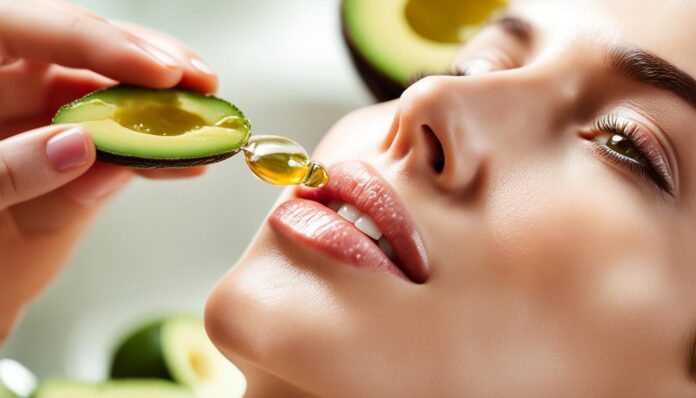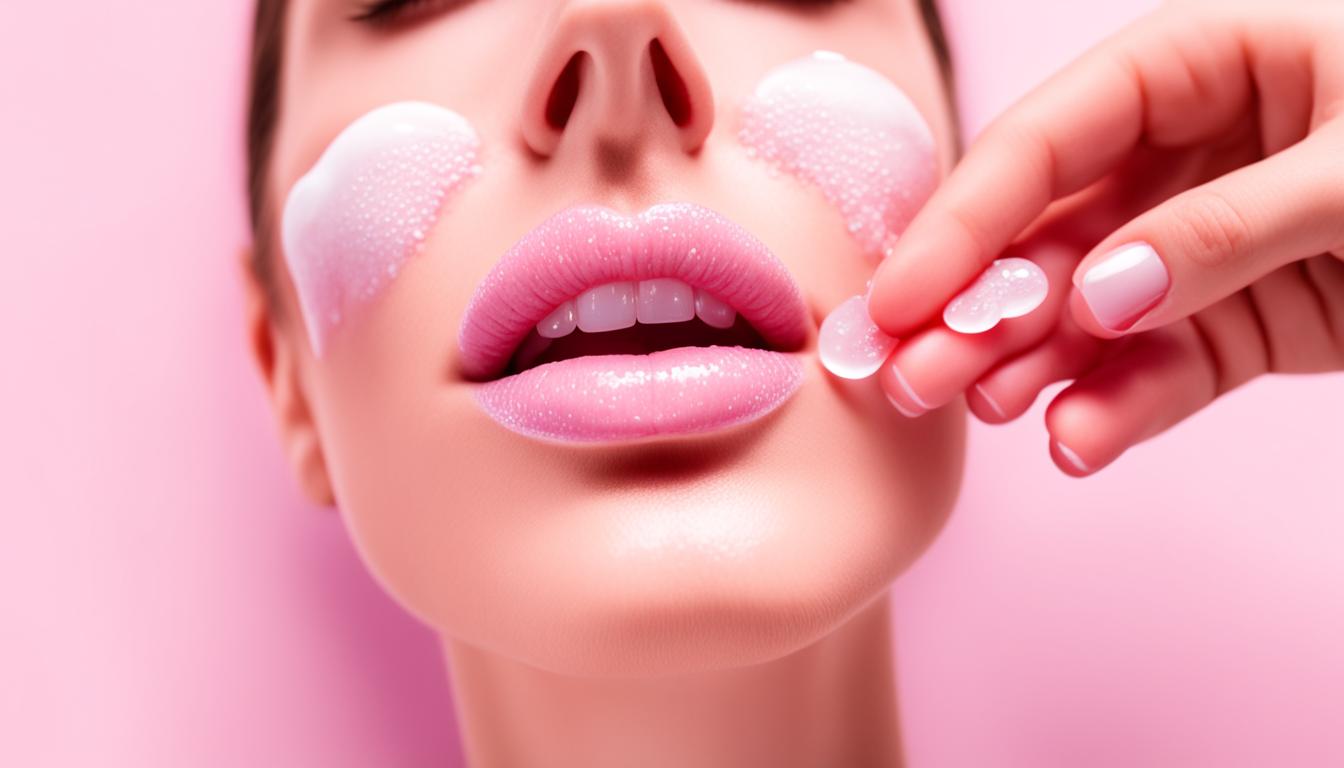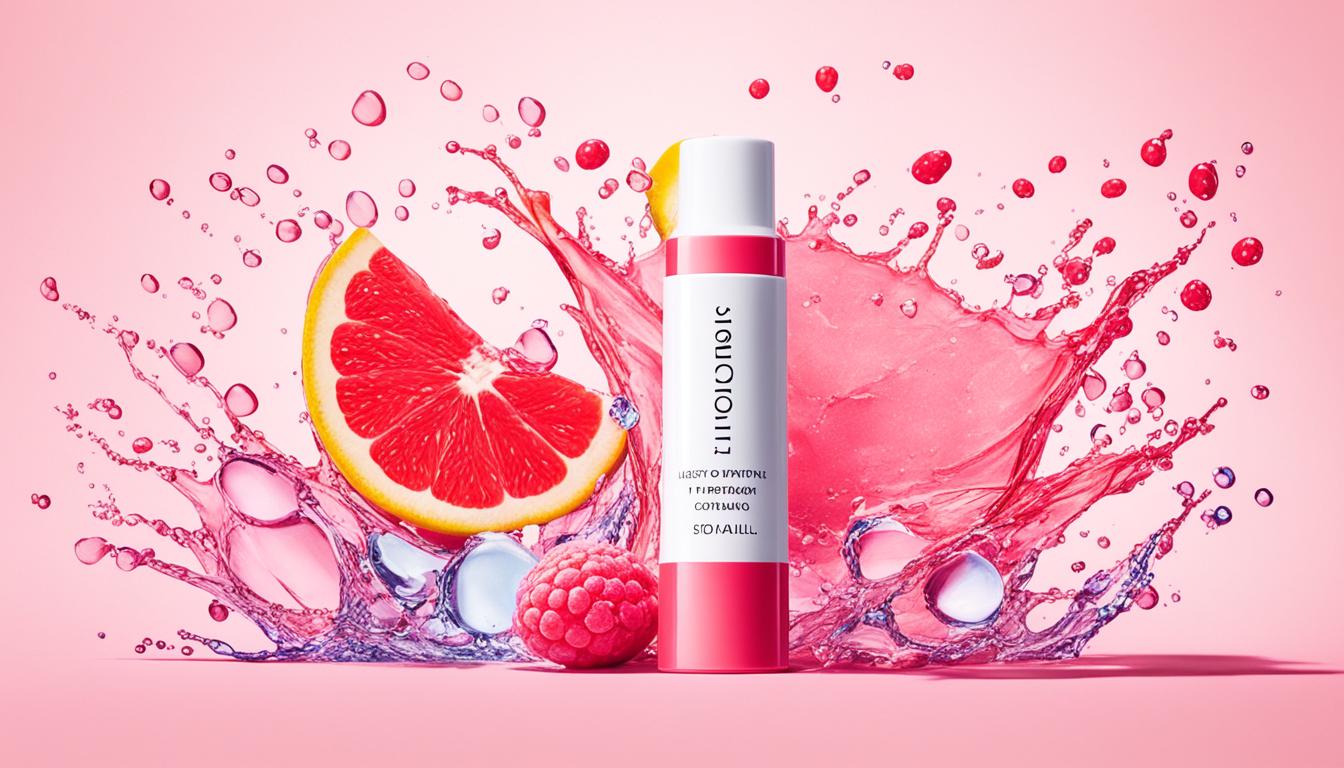
Lips don’t have oil glands like other skin parts, making them dry and irritated easily. If you often have chapped lips in dry or cold weather, you’re not alone. These delicate parts need special lip care to stay healthy and full of life all year.
Creating a regular lip treatment routine is key. It should include hydration, exfoliation, and the right products. Using lip balms 2-4 times a day, especially when it’s cold, helps keep them moisturized. Let’s look at how to keep our lips soft and beautiful, no matter the season.
Key Takeaways
- Lips are more prone to chapping due to a lack of oil glands.
- Daily hydration is crucial for maintaining healthy lips.
- Exfoliate lips 1-2 times per week to remove dead skin.
- Use lip products with nourishing ingredients for better results.
- Don’t forget to protect lips from sun exposure with SPF.
The Importance of Lip Care
We often forget about lip care, but it’s key for their health and look. Our lip skin is thinner and more delicate than other face skin. This makes it more prone to damage from the sun, wind, and cold. Knowing how to keep our lips hydrated can help avoid dryness and improve repair efforts.
To shield our lips, using a lip balm with SPF all day is smart, especially outside. Bad habits like licking or picking at dry lips make things worse. Also, some lipsticks with harsh chemicals can dry out our lips more.
Our lip care should change with the seasons. In dry winter months, we might need a more moisturizing lip balm. Ingredients like hyaluronic acid, glycerin, and peptide collagen are great for hydration. Products with beeswax or shea butter can give long-lasting color without drying out our lips.
Starting early with lip care can prevent aging signs and protect against sun damage. Gently exfoliating once a week keeps lips smooth and prevents chapping. Simple home remedies, like coconut oil or homemade lip balms, can moisturize and protect our lips.
An effective lip care routine tackles current issues and promotes long-term health and beauty. By learning and following key steps for lip hydration and repair, we can improve our lip care.
Understanding the Anatomy of Your Lips
Our lips are a key part of our face, with a special lip anatomy. They don’t have oil glands, making them dry and sensitive. This sensitivity can cause chapping and cracking, showing the need for good lip protection.
Knowing what makes up our lips helps us take better care of them. The main parts are the Vermilion, Vermilion Border, Cupid’s Bow, and Philtrum. These parts help shape and make our lips look good. It’s important to know about them, especially when thinking about cosmetic treatments to keep them looking young and full.
Choosing treatments depends a lot on our lip’s size and how even they are. Since people from different backgrounds have different lips, it’s key to pick the right care for ours. Understanding lip anatomy greatly helps our lip health.
Get Started On A Lip Care Routine
Starting a good lip care routine is key to having soft, healthy lips. Focus on daily hydration and gentle exfoliation to boost lip health. Simple practices can greatly improve how our lips look and feel.
Daily Hydration
Hydration is crucial for our lip care. Using moisturizing lip balms with shea butter and hyaluronic acid helps keep moisture in. For dry lips, apply lip balm every hour or when needed. This keeps lips soft, prevents cracking, and stops peeling.
Gentle Exfoliation
Gently removing dead skin cells is key for smooth lips. Exfoliate lips 1 to 2 times a week. This reveals new skin and makes hydrating products work better. Using lip scrubs with natural ingredients makes the process refreshing.

| Step | Description | Frequency |
|---|---|---|
| 1 | Apply hydrating lip balm | Every hour for dry lips |
| 2 | Hydration routine | Daily |
| 3 | Gentle exfoliation | 1-2 times a week |
| 4 | Use SPF lip balm | Every 2 hours when outdoors |
| 5 | Apply lip patches | 2-3 times a week |
| 6 | Stay hydrated | Daily |
Effective Lip Treatment Techniques
We can use several effective lip treatment techniques for beautiful, healthy lips. These methods focus on keeping our lips hydrated and gently exfoliated. By following these steps, we can see better lip health and look.
Steps for Hydration
First, we should focus on keeping our lips hydrated. Using lip balm often helps keep moisture in and prevents dryness. Here are some important tips:
- Apply lip balm after meals to lock in moisture.
- Use a thicker balm before bedtime to nourish lips overnight.
- Consider balms with natural ingredients such as kukui nut oil or aloe for extra hydration.
These habits keep our lips moist and ready for other treatments.
How to Exfoliate Safely
Exfoliating our lips makes moisturizers work better and smooths the surface. But, we must exfoliate safely to avoid irritation. Here’s how to do it right:
- Choose a gentle lip scrub with natural exfoliants, like raw cane sugar.
- Apply the scrub in small circular motions, focusing on dry areas.
- Limit exfoliation to 30 seconds to avoid skin damage.
- Rinse off and apply a nourishing lip balm afterward.
Following these steps makes our lip treatments work better and keeps our lips healthy.
Choosing the Right Lip Products
Choosing the right lip products is key to keeping our lips healthy. Start by picking a moisturizing lip balm with ingredients like Hyaluronic Acid and Glycerin. These help keep moisture in and protect our lips.
Avoid lip products with synthetic fragrances or harsh chemicals. They can irritate our lips. Instead, look for balms with beeswax or shea butter. These are great for keeping moisture in, especially in winter.
When picking lip products, consider these factors:
- Natural Ingredients: Choose balms rich in natural oils and butters.
- Nourishing Properties: Look for hydrating components such as Glycerin and Hyaluronic Acid.
- SPF Protection: Consider lip balms with SPF for outdoor activities, even in winter.
- Texture: Identify the preferred texture, whether it be thick ointments or lighter glosses.
There are many types of lip balms available:
| Type | Description | Examples |
|---|---|---|
| Clear Lip Balms | Simple, no color, ideal for daily use. | Lanolin-based balms |
| Tinted Lip Balms | Provide hydration with a hint of color. | Hanalei’s lip treatment |
| Multi-Balms | Versatile for lips and other dry areas. | Natural oils and butters |
| Ointments | Thicker formulation for intense care. | Beeswax and herbal blends |
By choosing wisely, we can keep our lips soft, hydrated, and protected. It’s important to find the right balance in our lip care routine. This keeps them healthy and beautiful.
Hydration: Lip Balm and Moisturizers
Choosing the right lip balm and moisturizers is key to keeping our lips hydrated and healthy. Knowing which ingredients work best can improve our lip care. Ingredients like beeswax and natural oils create a barrier against the elements.
Ingredients to Look For
When picking a lip product, look for these ingredients:
- Beeswax: Creates a protective layer and retains moisture.
- Coconut Oil: Known for its deep hydration properties.
- Shea Butter: Offers intense moisture and promotes skin elasticity.
- Jojoba Oil: Mimics natural skin oils for effective absorption.
- Vitamin E: Provides antioxidant benefits and supports skin health.
Recent feedback from around 350 respondents revealed the top moisturizing lip balms:
| Brand | Key Features | Cost per Ounce |
|---|---|---|
| Aquaphor | Healing, long-lasting | $1.40 |
| Nuxe Rêve de Miel | Non-glossy, longevity | Approx. $30 |
| Lucas Papaw Ointment | Multitasking abilities | Approx. $30 |
| Nivea Lip Butter | Super moisturizing, subtly scented | Approx. $10 |
| Burt’s Bees | Peppermint scent, non-sticky | Approx. $12 |
| EOS | Taste, smell, affordable | Approx. $8 |
| Fresh Sugar Lip Treatment | SPF content, lush formula | Approx. $30 |
When to Reapply Lip Balm
It’s important to reapply lip balm every 2-4 hours to keep our lips hydrated. This is especially true in dry or harsh environments. Reapplying keeps our lips feeling fresh and prevents dryness.

Nutrition and Lifestyle Tips for Proper Lip Care
Looking after our lips is not just about what we put on them. Eating right is key to keeping them healthy. Foods full of vitamins and minerals help our lips stay strong and look good. By eating the right foods, we can make our lips healthier and more attractive.
Vitamin C is super important for skin health. Eating foods high in vitamin C, like oranges and bell peppers, can help prevent dry lips. This vitamin keeps our skin, including our lips, in top shape.
Vitamin E is found in leafy greens and nuts. It helps reduce swelling and makes skin thinner. Since our lips are thin, they dry out easily. Eating foods rich in vitamin E, like spinach and almonds, can keep our lips moisturized.
Drinking enough water is also crucial for our lips. Since our lips don’t have oil glands, they can’t keep moisture on their own. Staying hydrated helps our lips stay soft. Plus, protecting our lips from cold weather and the sun can stop irritation and damage.
Our daily habits can affect our lip health too. Exfoliating our lips once or twice a week removes dead skin and makes them smooth. Using lip oils, like Gisou Honey Infused Lip Oil, gives deep hydration and protects our lips from harm.
Using homemade lip care recipes can also help. Ingredients like honey and coconut oil can moisturize, exfoliate, and feed our lips. These recipes are gentler than many commercial products.
| Nutrient | Foods | Benefits for Lips |
|---|---|---|
| Vitamin C | Citrus fruits, strawberries, bell peppers | Decreases risk of dry skin and lips |
| Vitamin E | Leafy greens, nuts, seeds | Reduces skin swelling and thickness |
| Water | Plain water, herbal teas | Maintains hydration and moisture |
| Antioxidants | Fruits, vegetables, lip oils | Protects from free radical damage |
Sun Protection for Your Lips
Our lips need extra care, especially against the sun. The skin on our lips is very sensitive to sun damage. Without protection, it can get dry, chap, or even lead to serious skin issues. It’s key to pick the right lip sun protection products.
Choosing SPF lip care with an SPF of 30 or higher is smart, as advised by the American Academy of Dermatology. This level protects us from harmful UV rays. Even though SPF levels can be as low as 6, a minimum of SPF 15 is usually enough for lip protection.
There are two main types of sunscreen for lips: mineral and chemical. Mineral sunscreens use zinc oxide and titanium dioxide, great for sensitive skin. Chemical sunscreens have ingredients like avobenzone and oxybenzone. It’s important to pick what works best for our skin.
Here is a comparative overview of popular lip balms with SPF:
| Product | SPF | Key Ingredients |
|---|---|---|
| Nivea Smoothness Lip Care | 15 | Shea Butter, Jojoba Oil, Avocado Oil |
| Aquaphor Lip Repair Lip Balm | 30 | Avobenzone, Octinoxate, Octisalate, Octocrylene |
| Jack Black Intense Therapy Lip Balm | 25 | Shea Butter, Avocado Oil |
| EltaMD UV SPF Lip Balm | 36 | Octinoxate, Zinc Oxide |
| MDSolarSciences Hydrating Sheer Lip Balm | 30 | Avobenzone, Octisalate, Homosalate |
| Cay Skin Isle Lip Balm | 30 | Avobenzone, Homosalate, Octisalate |
Reapply sunscreen every two hours, or more often if you’re outside, to keep your lips protected. This helps keep them hydrated and safe from damage. Adding SPF lip care to your daily routine protects your lips from the sun’s harmful effects.
Conclusion
Revitalizing our lips is essential, not just a luxury. By following a good lip care routine, we can make our lips healthier and look better. We can fight dryness with hydration, gentle exfoliation, and quality products.
Studies show 97% satisfaction with lip care products. Using these tips helps us get beautiful, revitalized lips.
After just four weeks of regular care, our lips show big improvements. Each time we apply, we boost moisture, volume, and texture. This makes our lips look better.
Experts say this routine helps reduce lip lines and improves definition. It lets us enjoy our natural smile more.
Let’s make caring for our lips a daily habit. By hydrating, using nourishing balms, and exfoliating gently, we keep our lips healthy and vibrant. Together, we can get the healthy, full lips we want, boosting our confidence.
FAQ
How often should we apply lip balm for optimal hydration?
We should apply lip balm every 2-4 hours. This is especially true in dry or harsh environments. Doing so keeps our lips fresh and healthy all day.
What ingredients should we look for when choosing a lip treatment?
Look for lip balms with ingredients like Hyaluronic Acid, Glycerin, Shea Butter, and natural oils. These ingredients deeply moisturize and protect our lips.
How can we safely exfoliate our lips?
Use a lip scrub in small, circular motions for 30 seconds. Let the nourishing ingredients soak in before rinsing. Exfoliating 1-2 times a week makes lips smoother and healthier.
How does our diet influence lip health?
Eating a balanced diet with vitamins and omega-3 fatty acids helps our lips. Fruits and vegetables nourish our lips naturally, making them less prone to dryness.
Why is sun protection important for our lips?
Our lips need protection from the sun’s harmful rays. Lip products with SPF 30 or higher prevent sun damage. This keeps our lips healthy and lowers the risk of precancerous lesions.
What can we do to prevent chapped lips?
To prevent chapped lips, keep up a consistent lip care routine. Use lip balms regularly, exfoliate gently, and avoid products with synthetic fragrances or harsh chemicals.
How do we know if our lip care routine is effective?
Check if your lip care routine is working by looking for improvements in hydration, texture, and appearance. If your lips feel soft, supple, and are free from cracks or dryness, it’s working.
